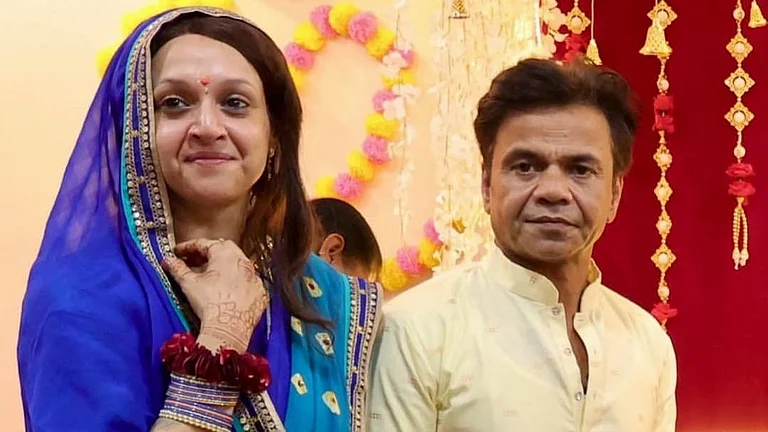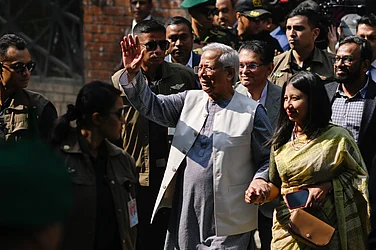Iran men’s football team
At the 2022 Qatar World Cup, the team refused to sing the national anthem before a match against England at the Khalifa International Stadium. It was a spectacular act of defiance, leading to an intimidating backlash from conservative leaders at home. At the next match, the players resumed singing the anthem. But by then they had made their point, that too on a global stage.
Iran men’s volleyball, water-polo, beach soccer teams
Giving the national anthem the silent treatment became the preferred way of protesting for Iranian sports teams. Another common method was not celebrating victories or goals. After Amini’s death, the country’s basketball, beach soccer, volleyball, and water-polo teams all gave the anthem a miss at some point. And at the 2022 Beach Soccer Intercontinental Cup in Dubai, Iran's Saeed Piramoon showed his support for his countrywomen by mimicking cutting his hair after scoring a goal. Iran won the tournament by beating formidable Brazil in the final, but did not celebrate.
Elnaz Rekabi, sport climber
The wiry 33-year-old with a quiet determination about her thumbed her nose at the hijab rule by competed at the 2022 Asian Championships in Seoul with her hair exposed. Not wearing the hijab properly was why Amini had been arrested by the authorities. When Rekabi returned to Iran, a brave choice after having angered the establishment, she said her decision to turn up for her round without the hijab was unintentional. But those who know her believe Rekabi fully intended to make a strong statement against the culture police.
Sara Khadem, chess player
In December 2022, at the FIDE World Rapid and Blitz Championships in Almaty, Kazakhstan, Khadem refused to wear the hijab. Instead, she showed up at the board with her hair unencumbered. After the tournament, not wanting to risk life and limb, the 26-year-old went to Spain with her infant son and her husband, film director Ardeshir Ahmadi. Khadem knew Spain well as she had travelled there frequently for tournaments. She has now made it her casa.
Sardar Azmoun, footballer
The towering 28-year-old Leverkusen striker, called the ‘Iranian Messi’, has been arguably the most famous and steadfast supporter of protests against government brutality. At the World Cup, he even risked being sidelined by speaking out on Instagram against the injustices being meted out to demonstrators back home. While his future with the national team may be uncertain, Azmoun is in good nick for his club in the Bundesliga.
Amir Nasr-Azadani, footballer
While those like Sara Khadem and Sardar Azmoun had the time and options to leave their country, some others did not. Also, their crimes were deemed as more serious. Iranian footballer Amir Nasr-Azadani, for one, was sentenced to 26 years in prison for his alleged involvement in the murders of three Basij officers — paramilitary volunteers affiliated with the Islamic Revolutionary Guard Corps (IRGC). The court ruled that Nasr-Azadani was guilty of “partaking in enmity against God” by participating in the protests.
Ali Daei, football
If Azmoun is among the most well-known current players, Daei is a revered retired star. And Iran’s all-time leading international goal-scorer has been quite critical of the regime and its heartless ways.
Despite his standing in Iran, Daei has not been spared by the government. When his wife and daughter were on their way to Dubai to meet him, officials forced the flight to land in Kish Island in the Persian Gulf and questioned them.
Earlier, Daei had urged the government to “solve the problems of the Iranian people rather than using repression, violence and arrests”.
Mohammad Mehdi Karami, karate
The 22-year-old former national champion suffered the worst possible punishment —death— for reportedly killing a Basij guard during a protest in Karaj, near Tehran.
Karami was executed on January 7 after a trial that Amnesty International said “bore no resemblance to a meaningful judicial proceeding”. As per reports, Karami got only 15 minutes and a government-appointed lawyer to defend himself. When the court announced its verdict —death penalty— Karimi reportedly made a heartbreaking call to his father, a tissue paper vendor.
He said, "Dad, they gave us the verdict. Mine is the death penalty. Don't tell Mum anything.”


























